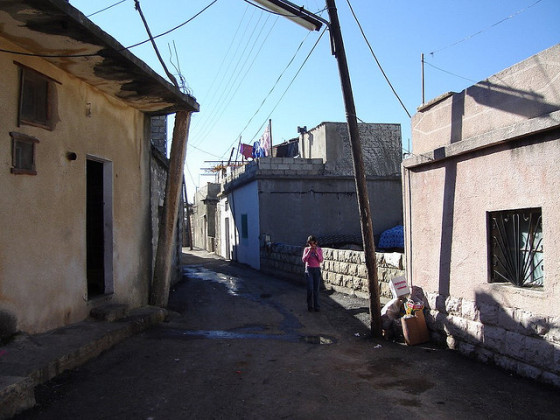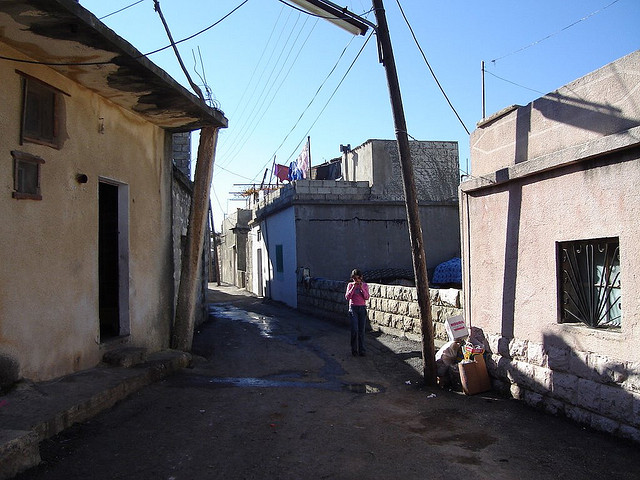
By Robin Yassin-Kassab
By arrangement with Qunfuz
If the US-led West wished to invade and occupy Syria, or to engineer regime change from afar, it would have taken advantage of the two-and-a-half-year chaos in Syria to intervene long before now.
When the US-led West invaded Iraq in 2003, Saddam Hussain was contained. He’d committed his genocides in the past, when he was an ally of the West against Iran, and in 1991, under Western military noses (as he slaughtered Shia rebels and their families en masse, the allied forces in Kuwait and southern Iraq gave him permission to use helicopter gunships, and watched). But in 2003 Saddam was contained and reasonably quiet. There was no popular revolution against him. The West invaded anyway, on the pretext of inexistent Weapons of Mass Destruction.
American inaction made Assad believe he could get away with a bigger show.
The Syrian regime’s ultra-violent repression of a peaceful protest movement spawned an armed resistance. The regime met the armed resistance with genocide and ethnic cleansing. Then a week ago the regime struck multiple targets in the Damascus suburbs with chemical weapons, perhaps killing as many Syrians in three hours as Palestinians were killed in Israel’s month-long rampage in Gaza (2008/9).
The conflict has been well and truly internationalised for a long while now. Saudi Arabia, Qatar and Turkey have provided limited and intermittent military supplies to various parts of the opposition (the US has prevented them from delivering heavy weapons). The international brigades of the Islamic State of Iraq and al-Sham–an enemy both of the regime and the democratic opposition to the regime–has been empowered in pockets of northern Syria. The regime has received much more serious financial and military help from Russia and Iran, and has brought in Hizbullah and Iraqi sectarian militias to help it fight its battles. Hizbullah’s switch from defence against Zionism to repression of a revolutionary Arab people has propelled Lebanon back to the verge of civil war. Meanwhile, between a quarter and a third of Syrians are displaced, destabilising Turkey and Jordan as well as Lebanon.
A year to the day before the massive poison gas attacks, Obama set a supposed ‘red line’ on the regime’s use of chemical weapons. Whenever the regime has introduced a new weapon, it has done so quietly and steadily, until its use is normalised and forgotten internationally. So it was with artillery, helicopter gunships, aerial bombardment, scud missiles–first these were used rarely, then more frequently, then on a daily basis. And so it is with the gas. Obama’s chemical red line had already been repeatedly broken in a small way before last week’s atrocities. American inaction made Assad believe he could get away with a bigger show.
By this mass attack, Assad was not only trying to clear areas close to the capital in which rebels were deeply entrenched and advancing; he was also telling the military and popular opposition, “Look, I can do what I want. I can increase the pace of the ethnic cleansing and genocide, and still no one will intervene or allow you to become properly armed.”
Should a tyrant be left unchecked to gas his people?
So now Obama feels he must act, symbolically at least, to show the larger world as well as Assad that America’s word still means something, that it still makes claims to ensuring international order.
It goes without saying that all states–if we must compare them with people–are hypocrites, and America, as (still) the world’s most powerful state, much more than most. The white phosphorus and depleted uranium munitions it used in Iraq, for instance, can certainly be considered as weapons of mass destruction, though even their use cannot be compared to Assad’s sarin savagery. And late 20th Century America actively aided Saddam’s chemical programme. But simplistic ‘anti-imperialists’ (the sort who haven’t noticed Russia’s blatant imperialism in Syria) should reflect on the complexity of the situation. Should a tyrant be left unchecked to gas his people? If Israel were doing it to the Palestinians, would outside intervention (of course there would be none) to deter Israel be absolutely wrong? Was it right to leave the Bosnian Muslims to be slaughtered? (Many statist leftists would of course unhesitatingly answer yes to this question). Even with our hypocritical and frequently criminal ‘international community’, is there no validity in attempting to preserve the semi-taboo on the mass use of WMD?
I cannot say what will happen, or if it will happen, or what the ramifications will be. I expect, however, that any American-led attack will not dramatically change the balance on the ground. Obama wants to be seen to be acting, and to deter. He will be scared that Assad, Hizbullah or Iran will respond in such a way that he is pressured to expand the operation to end the regime. And he doesn’t want to do this. General Martin Dempsey has recently explained why–America can’t find any branch of the opposition ready to assume power and serve American interests.
I expect the upcoming attack to be, in effect if not in image, tepid.
One reason that the West doesn’t want to end the regime is that, in the north and east, the al-Qa’ida type militias (indirectly created by Assad’s traumatisation of the country, as well as by the political failures of loyalist traditionalist clerics) are growing in strength. Their strength flows from the fact that the West and the Arabs failed to arm the Free Army. The ineffective Syrian National Coalition must also bear some of the blame for not working harder to organise a national army from the start, before the jihadists had time to establish themselves. Western, Syrian and Arab timidity and Islamophobia have brought on the worst.
I expect the upcoming attack to be, in effect if not in image, tepid. It may not do any good at all. It may allow Assad to reap the ‘resistance’ propaganda victory without changing the calculus on the ground.
If there is any change to calculus on the ground, it will be because the Sauds are increasing military aid after the mass gas attacks. Apparently 40 tons-worth came in through Turkey this week. But will that be sustained? Never before now.
And again, the Sauds, like the Americans, like all states, are acting according to their interests. They back Sisi’s junta in Egypt as it rolls back the victories of the revolution there. In Syria, the Sauds are interested in weakening Iran and Hizbullah, obviously not in facilitating victory for either democrats or radical Islamists who reject Saudi kingship. Syrian fighters facing exile or genocide will take weapons from where they can, but they understand that in the medium and long term, they are on their own, as they have been for the last two and a half years.
Robin Yassin-Kassab was born in west London in 1969. Except for six months in Beirut, he grew up in England and Scotland. He has lived and worked in London, France, Pakistan, Turkey, Syria, Morocco, Saudi Arabia and Oman. He is the author of The Road from Damascus, a novel published by Hamish Hamilton and Penguin, and by il Saggiatore in Italy. He is currently working on a second novel. Robin co-edits (with Ziauddin Sardar) the Critical Muslim, a quarterly magazine that looks like a book. He is also a co-editor and regular contributor to PULSE, recently listed by Le Monde Diplomatique as one of its five favourite websites.

